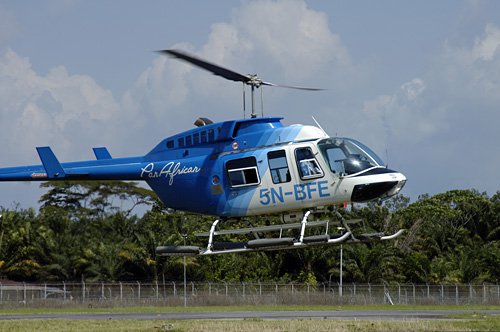The Unlikely Admiral
![]()
Helicopter Adventures in the Niger River Delta
![]()
 In the mid-1980s we were contracted to fly
a medical service out of Port Harcourt.
It was a health project sponsored by the U.N. to provide immunization to remote
villages in the Delta area. The Nigerian military supplied the medical personnel
and Pan African Airlines supplied one Bell 206L helicopter. Pilots took it in turn for a
one week tour. It was interesting work and a good change from the normal
offshore operation at Escravos. Each day we flew to two locations where we
would shut down for a couple of hours while the medics immunized the
villagers. These were the days before
GPS and finding these remote villages a hundred or so miles from base took
careful map-reading.
In the mid-1980s we were contracted to fly
a medical service out of Port Harcourt.
It was a health project sponsored by the U.N. to provide immunization to remote
villages in the Delta area. The Nigerian military supplied the medical personnel
and Pan African Airlines supplied one Bell 206L helicopter. Pilots took it in turn for a
one week tour. It was interesting work and a good change from the normal
offshore operation at Escravos. Each day we flew to two locations where we
would shut down for a couple of hours while the medics immunized the
villagers. These were the days before
GPS and finding these remote villages a hundred or so miles from base took
careful map-reading.
On this particular morning the first
location was a village about fifty minutes flying time to the north-west of Port Harcourt. I can’t
remember the village’s name but it nestled on the side of a small creek amidst
dense and encircling jungle. We came overhead while I took in the small
thatched huts, dugout canoes pulled up on the foreshore and the upturned faces
of villagers probably seeing a helicopter for the first time in their lives. There
was an area of reasonably open ground near the village centre and here I landed
and shut down. While the medics did their stuff, I took a stroll through this
primitive hamlet, observing life as it must have been in the stone age and ‘savouring’
the smell of wood smoke, fish and cassava mixing with the ever-oppressive aroma
of tropical humidity. The people were smiling, friendly and inquisitive but
terribly poor in their rags of clothes and God-knows-what existence. Fifteen
minutes saw me back in the cabin of the helicopter, feet up and reading a paperback to
pass the time. I was lost in my novel when there came a knock on the cabin
door.
Outside stood a young man, much better
dressed than the rest in white slacks and coloured shirt. I opened the door to
his smiling face.
“Morning, Captain,” he said, cheerfully, “would you like a
cool drink in my house while you’re waiting?”
I took a quick glance at the
dilapidated thatched huts around us. “Er, no thanks; I can’t drink while I’m flying.”
He seemed to read my thoughts and smiled again. “Not here, Captain; my house is
a short distance away and a glass of iced fruit juice wouldn’t do any harm.”
It certainly wouldn’t and I was intrigued at the thought of “ice” in this steaming
jungle. “Your house?”
He shook his head. “Not mine, exactly: it’s
the home of my uncle, Vice-Admiral Ngomo, once Commander-in-Chief of the
Nigerian Navy.”
Now I really had caught the hook. I closed my book, climbed out
and said, “Lead on.”
He led me along what was virtually a tunnel
through the jungle. With some misgivings at this seeming trek into the
underworld, I kept a good lookout at the arching trees above for Mambas. I had
been told these snakes got their victims by dropping on the unsuspecting walking
below and this seemed as good a place as any for them to lurk. No Mambas though
and ten minutes walk brought us to the clearing.
It was a large clearing and I was surprised
I hadn’t seen it in my recce before landing, especially the house. In reality
it wasn’t so much a house as a huge brick-built two-storey mansion right here
in the middle of the jungle, a diesel generator purring somewhere in the
background but multi-miles from the nearest civilization. My host led me
through patio doors into a blissfully cool lounge where background music played
over expensive furniture and thick piled carpet. He rang a small bell and a
white-coated steward came and took my order for iced orange juice. It was all
quite unreal. As I relaxed in a deep armchair and sipped my drink, I asked the
inevitable questions.
“You say your uncle was Commander-in-Chief
of the Nigerian Navy?”
“Yes, until he retired a few years ago.”
I glanced around me. “But why build his
house here in this remote area; we must be at least a hundred and fifty miles
from the sea?”
He explained and a fascinating story it was
too.
“The reason my uncle built his house here
is that this is his village. He was born here in one of those thatched huts
you’ve just seen. But, when he was eight years old, he heard that there were
missionaries many miles down-river providing education. So, he bid farewell to
his parents, piled a few things in a small dugout canoe and paddled away. He
reckoned he must have paddled forty miles before he came to the mission station
and there, true enough, he was taken in by the missionaries and educated until
he was fifteen. With this learning under his belt, he decided his future lay in
Lagos and there he made his way, securing a position as a clerk with the Elder Dempster Steamship Company. Nigerian independence was now only a few years away
and, like other British companies, Elder Dempster were committed to training
Nigerians for their new challenge. They were looking for suitable lads to train
as sea-going officers and my uncle had made a good impression in his time as a
clerk. He was offered a cadetship, served his time at sea and eventually
qualified for his second mate’s certificate. By now Nigeria had achieved
independence, seeking to form her own navy and looking for qualified navigators
to become naval officers. My uncle applied and, in spite of having no family connections
or influence, was accepted and sent to the Royal Naval College, Dartmouth in
England to train as a naval officer. He returned, made a name for himself as a
competent leader, and eventually rose to command the flagship of our navy, the
destroyer Nigeria. From this command he
was promoted Admiral and ultimately commanded the Nigerian Navy.
It was an amazing story, the most amazing I
had heard in all my time in Africa. This
was a man I would love to have met in person but he was away in Port Harcourt “on
business”. I asked the nephew if he had a photo of his uncle. He rang the bell
again and told the steward to bring the photo of the admiral. Minutes later two
stewards returned, struggling between them to carry a huge framed portrait of
the man himself, big and resplendent in full naval dress-uniform. There was
certainly character in those fine features and kind eyes.
It was time for me to
go and, on our return walk, the nephew told me that his uncle now paid
constantly for the education of ten boys from the village. I wondered if those
missionaries from far back ever knew of the fine crop they had sown with their
educational seeds.
Twenty minutes later we were lifting off
and heading for our next location but my thoughts were with a small boy
launching his primitive canoe and paddling off down-river for his rendezvous
with destiny.

![]()
A true Short Story by Chris Crowther. Chris has recently published a novel titled "BladeStrike". You can reach him through his web site http://www.chriscrowther.co.uk
The attitude indicator will guide you back to Inside Africa.
 Top of this
page.
Top of this
page.
Last modified on
April 13, 2007 .
© Virtual Horizons, 1996.